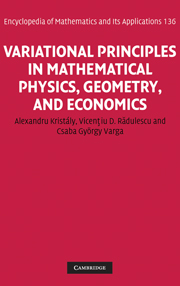 Variational Principles in Mathematical Physics, Geometry, and Economics
Variational Principles in Mathematical Physics, Geometry, and Economics from Part I - Variational principles in mathematical physics
Published online by Cambridge University Press: 05 June 2013
A man is like a fraction whose numerator is what he is and whose denominator is what he thinks of himself. The larger the denominator the smaller the fraction.
Leo Tolstoy (1828–1910)Variational principles are very powerful techniques that exist at the interface between nonlinear analysis, calculus of variations, and mathematical physics. They have been inspired by and have deep applications in modern research fields such as geometrical analysis, constructive quantum field theory, gauge theory, superconductivity, etc.
In this chapter we briefly recall the main variational principles which will be used in the rest of the book, such as Ekeland and Borwein–Preiss variational principles, minimax- and minimization-type principles (the mountain pass theorem, Ricceri-type multiplicity theorems, the Brezis–Nirenberg minimization technique), the principle of symmetric criticality for nonsmooth Szulkin-type functionals, as well as Pohozaev's fibering method.
Minimization techniques and Ekeland's variational principle
Many phenomena arising in applications such as geodesics or minimal surfaces can be understood in terms of the minimization of an energy functional over an appropriate class of objects. For the problems of mathematical physics, phase transitions, elastic instability, and diffraction of light are among the phenomena that can be studied from this point of view.
To save this book to your Kindle, first ensure no-reply@cambridge.org is added to your Approved Personal Document E-mail List under your Personal Document Settings on the Manage Your Content and Devices page of your Amazon account. Then enter the ‘name’ part of your Kindle email address below. Find out more about saving to your Kindle.
Note you can select to save to either the @free.kindle.com or @kindle.com variations. ‘@free.kindle.com’ emails are free but can only be saved to your device when it is connected to wi-fi. ‘@kindle.com’ emails can be delivered even when you are not connected to wi-fi, but note that service fees apply.
Find out more about the Kindle Personal Document Service.
To save content items to your account, please confirm that you agree to abide by our usage policies. If this is the first time you use this feature, you will be asked to authorise Cambridge Core to connect with your account. Find out more about saving content to Dropbox.
To save content items to your account, please confirm that you agree to abide by our usage policies. If this is the first time you use this feature, you will be asked to authorise Cambridge Core to connect with your account. Find out more about saving content to Google Drive.